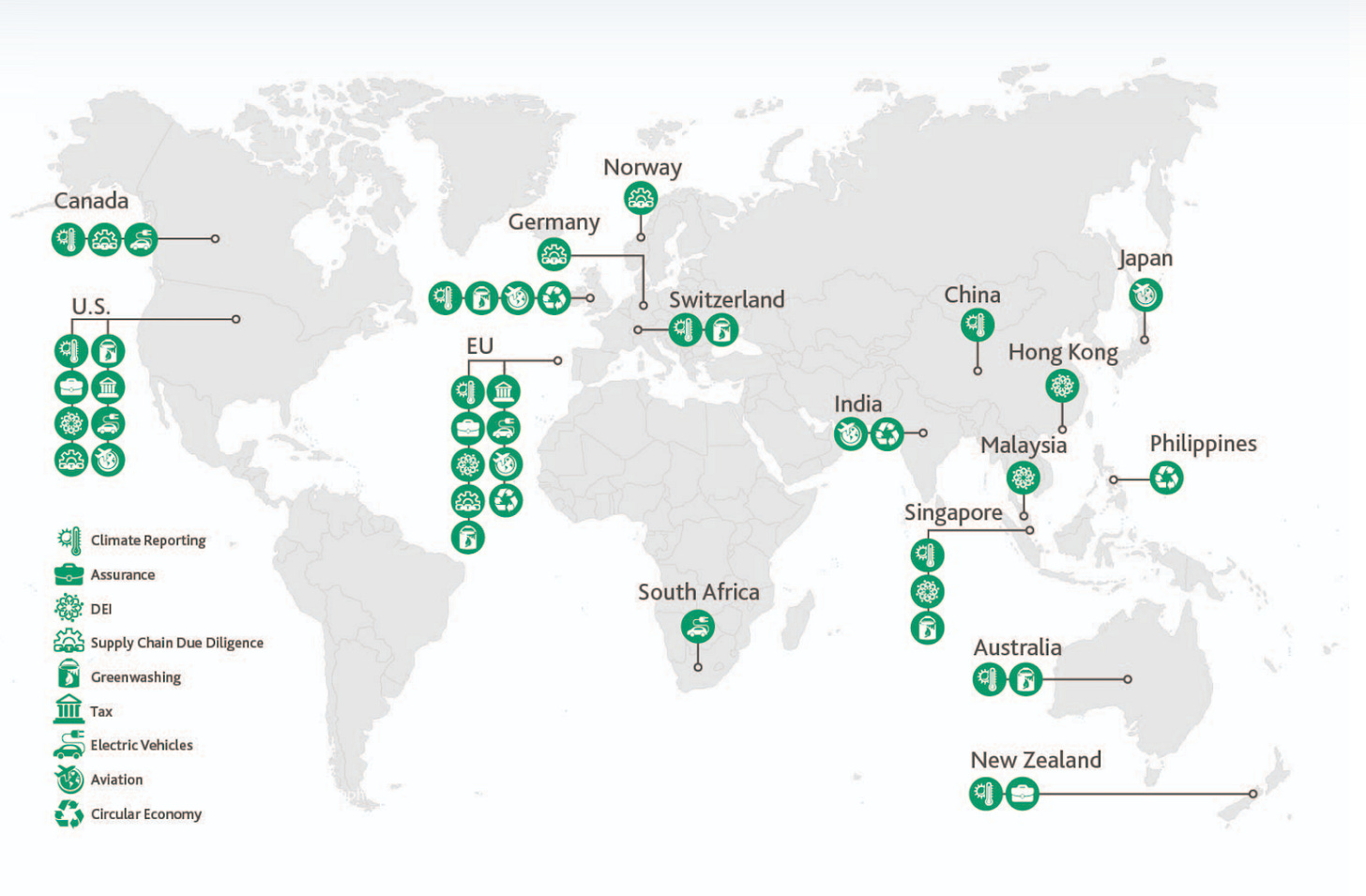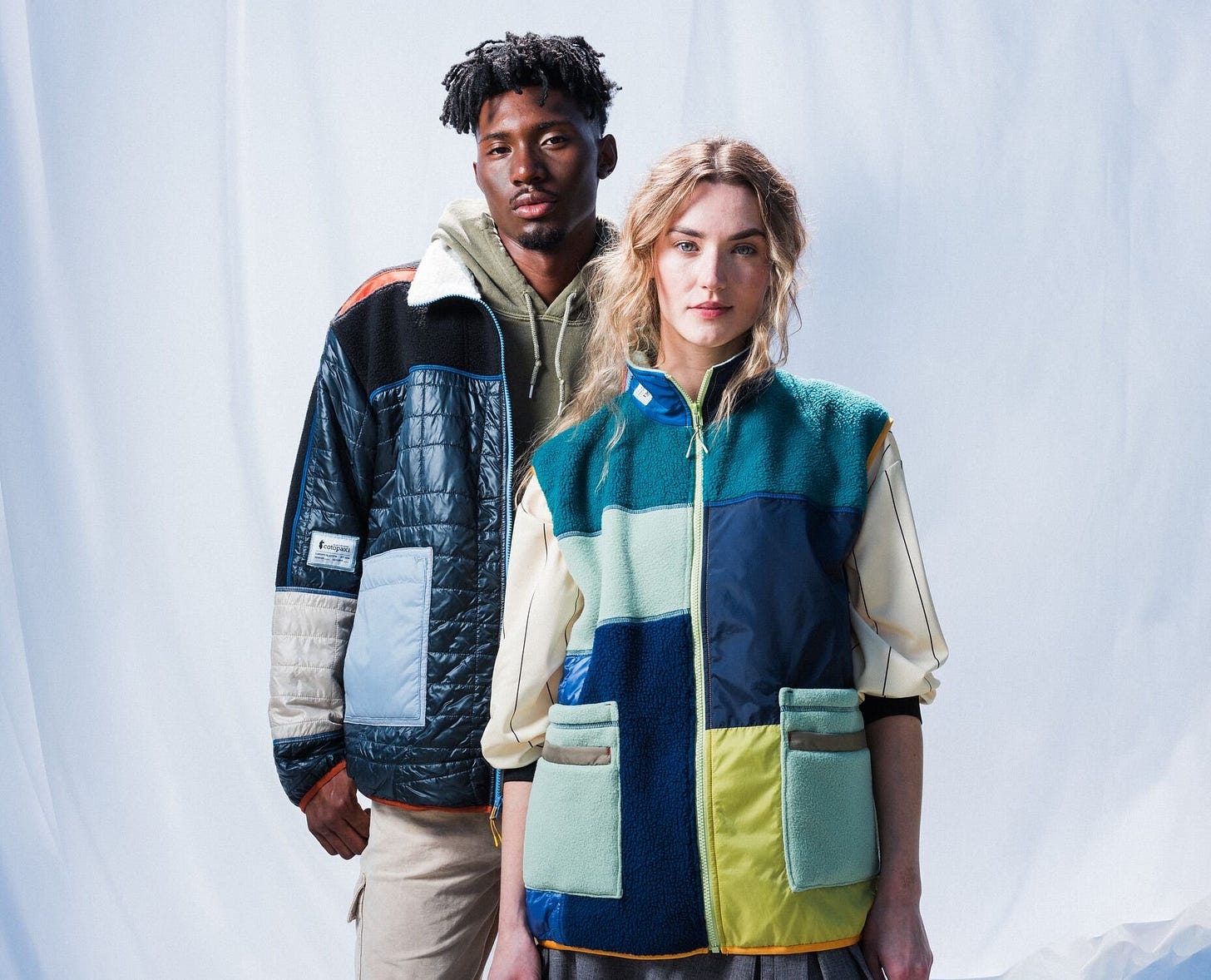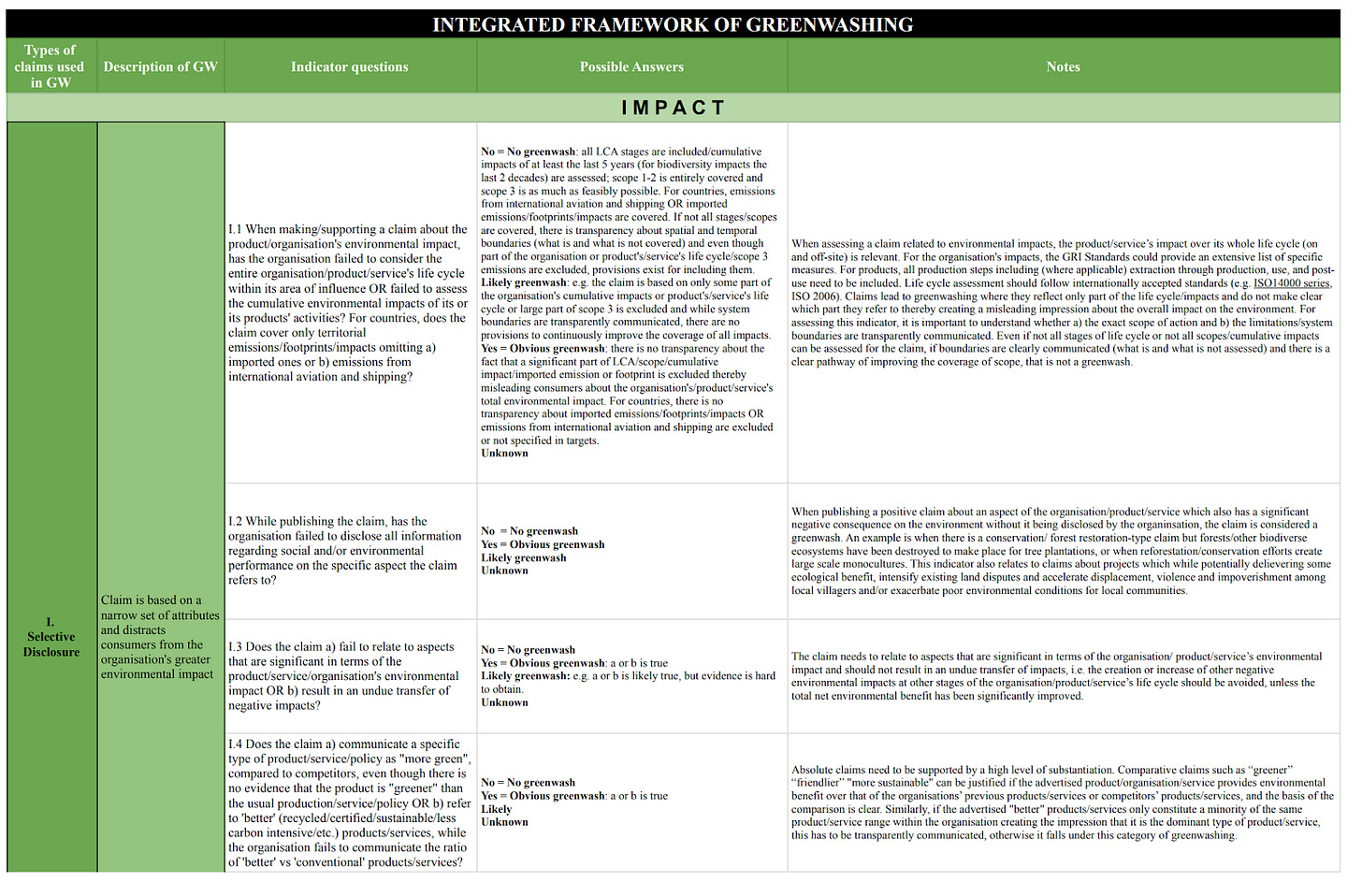🌱Greenwashing: Global regulation update and a framework to help you avoid it
+ good news from Cotopaxi, Revo Foods, Sxollie and more
Happy Monday! Every Monday we suit up and get serious - digging into a climate topic, rounding up the past week’s Good(s) News and sharing updates from across FTF, so you’re never out of the loop.
It’s a constant balancing act… between being more sustainable and updating your customers about it; and not overclaiming your sustainability credentials… it can be tricky! But have you ever experienced the frustration of trying to be as careful as possible about your comms, only to see your competitor splatter their vague claims all over their socials?? Thankfully the regulators are not only stepping in to look after the interests of the planet and the consumers… but we think they are also going to be helping those of us who are doing the hard work and are doing it by the book!
Let’s take a look at those regulations…
Greenly has worked with brands like LVMH, HelloFresh, L’OREAL, Lacoste and Huawei. Keen to learn more about how they can help your brand? Check out their website.
> In Focus
The Regulatory Update
Greenwashing… it’s everywhere, and it’s annoying. For those hoping to shop with their values in mind, it takes away agency. Worse still, it hurts the planet. But why is greenwashing problematic beyond its environmental impact?
It’s simply non-competitive! It involves brands lying to win over customers that otherwise may not purchase from them, and bringing in a profit due to these misleading claims. Pretty unethical, isn’t it? And within the last few years, it’s increasingly become more and more illegal.
A year ago we talked about greenwashing terms and the jargon-filled world that surrounds it. This time ‘round, we’ll help you sift through the policy weeds for different jurisdictions you might operate in, and suggest a resource for those who start sweating every time they put out a new campaign for fear of being called out for greenwashing (we see you, marketing department).
A world of regulations
Let’s have a look at the regions where most of our readers live, and the laws and guides that govern the ability to greenwash.

The European Union: It’s the most comprehensive, but also the most complex.
Directive 2024/825, the Empowering Consumers for the Green Transition Directive, was released in February 2024. It disallows the use of terms like ‘ecological,’ ‘eco-friendly,’ and ‘green’ without proper proof and regulates the use of sustainability labels.
Then there’s the Green Claims Directive, which we’ve touched on more comprehensively before. It aims to strengthen environmental accountability and reporting, demanding increased verification and evidence. This Directive is currently in the final stages of approval before being written into law.
These regulations bolster already-existing frameworks like the EU Taxonomy and Corporate Sustainability Reporting Directive (CSRD). Some EU countries like France and the Netherlands have also adopted their own, stronger, rules.
The United Kingdom: In the UK, the Green Claims Code reigns supreme and has held consumer-focused companies to six principles since fall 2021. The requirements include being truthful and accurate and considering the full lifecycle of products and services. While not a law on its own, failure to comply with the UK’s Green Claims Code can be held accountable through fines and penalties for violating through the Competition and Markets Authority, Trading Standards Services, or the Advertising Standards Authority.
The United States: The most significant regulation in the US is the Green Guides for the Use of Environmental Claims. But it’s just a guide that provides advice… not regulation. The first issue was in 1992 and the most recent revisions include new comments on carbon offsets and terms like ‘organic’ and ‘recyclable.’ Some states such as California do have more stringent legislation.
Australia: In Australia, guidance and penalties are handed out through the Australian Competition and Consumer Commission. Eight principles, ranging from ‘have evidence to back up your claims’ to ‘visual elements shouldn’t give out the wrong impression,’ are part of the guide.
Canada: The Canadian landscape was strengthened this year by Bill C-59, an addition to the Competition Bureau’s legislation. The bill no longer allows for unsubstantiated claims and will impose severe penalties on those who choose to proceed. Still, critics call the system a “slow process” with “few fines.”
Elsewhere in the world, greenwashing regulations are starting to come together. Think Singapore, Malaysia, and Japan. And for countries with weak or no greenwashing legislation, they can look to the international guideline: Global Guidance on Environmental Claims from the World Federal of Advertisers.
How have businesses responded?
It’s a mixed bag. Some who feel a push from employees and stakeholders to ‘walk the talk’ have pulled their game together. Others have simply stopped communicating on sustainability. In the US, 58 of the 100 largest companies have responded to greenwashing by keeping quiet - also known as greenhushing. While this could be seen as a good thing - they’re not lying about it anymore - they’re also not helping us move toward a better tomorrow. And if they are, we don’t know about it.
How can I avoid greenwashing?
For those marketers or impact reporters that get the heebie-jeebies every time you put something out about your sustainability efforts, we’ve got you. The Integrated Framework of Greenwashing was produced by leading greenwash researchers in 2022. It breaks down the questions you must ask yourself to avoid 13 types of greenwashing. The types included are also intentionally aligned with EU, US, and UK legislation.
The 13 types of greenwashing are:
Related to impact…
Selective disclosure
Empty claims
Irrelevant [information]
Lies
Just not credible
Not aligned with action…
Corporate responsibility in action (your messaging doesn’t align with your policies)
Dubious certifications/labels
Political spin
Co-opted endorsement
Communication-related…
No proof
Vagueness
Misleading symbols
[Unnecessary use of] jargon
Here’s how to use the Integrated Framework to hold yourself and others accountable:
Identify the type: Start by identifying one of the types of greenwashing you want to test for.
Run the test: Refer to its Description and Indicator Questions. Ask yourself each of the Indicator Questions and provide an honest answer.
Review your messaging: If for any of the Indicator Questions your claim turns out to be ‘Obvious greenwash’ or ‘Likely greenwash,’ revisit it before coming back to the framework. Iterate until the outcome is ‘No greenwash.’
Rinse and repeat: Repeat with any other types of greenwashing you might suspect to be present.
It’s a challenging time for sustainability communication, but the growing emphasis on rules and guidelines aims to create a more equitable marketplace for everyone.. Hopefully these regulations can lead to a future where consumers are empowered to make informed decisions and brands feel confident in transparently communicating their impact.
> Follow up with…
Webinar: The New Frontiers of Compliance & Consumption, Futerra and CMA
Guide: The Anti-Greenwashing Guide for Agency Leaders, Creatives for Climate
> Last week in consumer goods x climate…
The Good(s) News
»Up and coming brands
🎯 Sxollie has won Global Drinks Intel's 2024 RTD Producer Award for sustainable cider. Originally from South Africa and now based in London, the company makes its cider using only apples, without any added sugar, including "wonky" apples that might otherwise go to waste. Sxollie is also a certified B Corp, with an impressive score of 92.7.
🎯 Revo Foods, an Austrian vegan seafood company, has opened the world's largest 3D-printed food factory, capable of producing 60 tonnes of food per month. The factory's first product is an improved version of their mycelium-based salmon, which offers similar nutrients to real salmon, including omega-3, and vitamins B6, B9, and B12, and will be available in 500 Rewe stores.
🎯 Pollen + Grace announced their Bombay Potato Grain Bowl is now available on London North Eastern Railway First Class carriages.
🎯 Cotopaxi released their fully upcycled connection, Renovo. While majority of their items already use deadstock, this collection is one step further made entirely from pre-loved Cotopaxi items.
»Bigger organisations
⭐ Technicaps, The Groupe Pochet and Cilkoa have teamed up to produce a refillable skincare jar as part of the Re-Feel Project. The glass jar, made from 15% PCR, has also been light weighted to reduce its material use and impact. The refill cup is made from responsibly-sourced cellulose with a barrier treatment, containing no plastic, and making it fully recyclable.
⭐ Nestlé's KitKat and Lion brands have teamed up with Le Fourgon to test reusable stainless steel containers for their products. Consumers pay a €2 deposit for each container, which is refunded when the containers are collected for cleaning and refilling. This six-month trial in Hauts-de-France supports Nestlé's goal to make all packaging recyclable or reusable by 2025.
»Industry wins
⚡️Change Climate announced the update of its certification program by shifting from a carbon neutrality model to a focus on total corporate funding for climate projects and rebranding its Climate Neutral Certified label as "The Climate Label." This new framework emphasizes transparent funding for net-zero goals, encouraging companies to scale up their financial contributions to climate solutions.
⚡️The Hague will become the first city to legally ban advertising for fossil fuels, including items like petrol cars, air travel, and cruise ships, effective next year. This move, aimed at supporting its goal to be carbon-neutral by 2030, sets a stronger precedent than previous bans as it applies broadly to public spaces and doesn’t rely on individual negotiations.

Want good news sooner? We post our top 5 stories in our LinkedIn newsletter every Friday! If your CPG brand has good news to share, let us know.👇
Want more? Hang tight for ‘The Check-Out’ this Thursday for the latest brands in our basket. In the meantime, if you have any topics that you would like us to dig into, ping us an email on info@followingthefootprints.com to say hi!
Much love,
Team FTF





